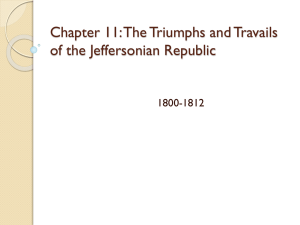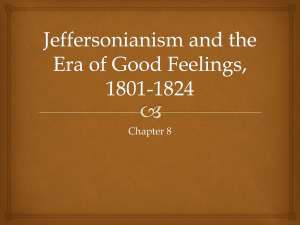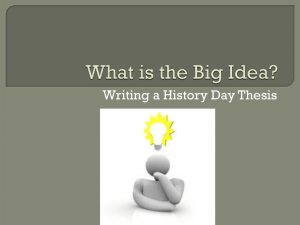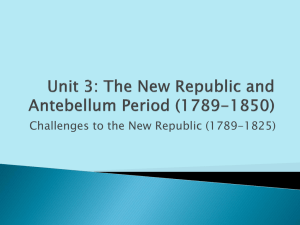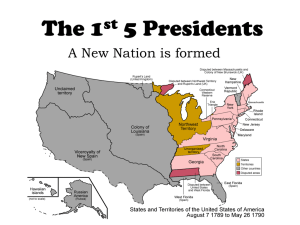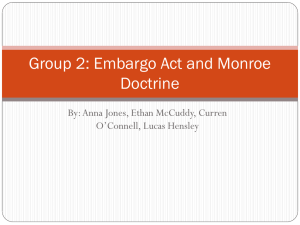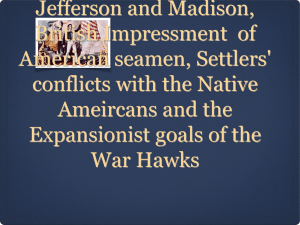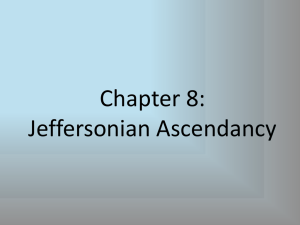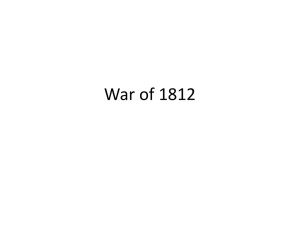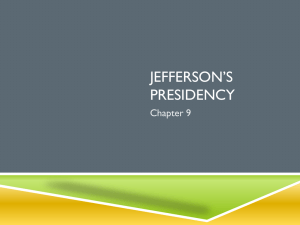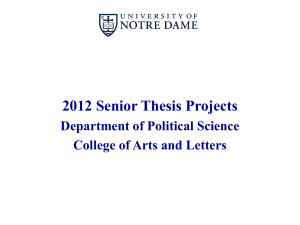Cracking the Free-Response Questions
advertisement
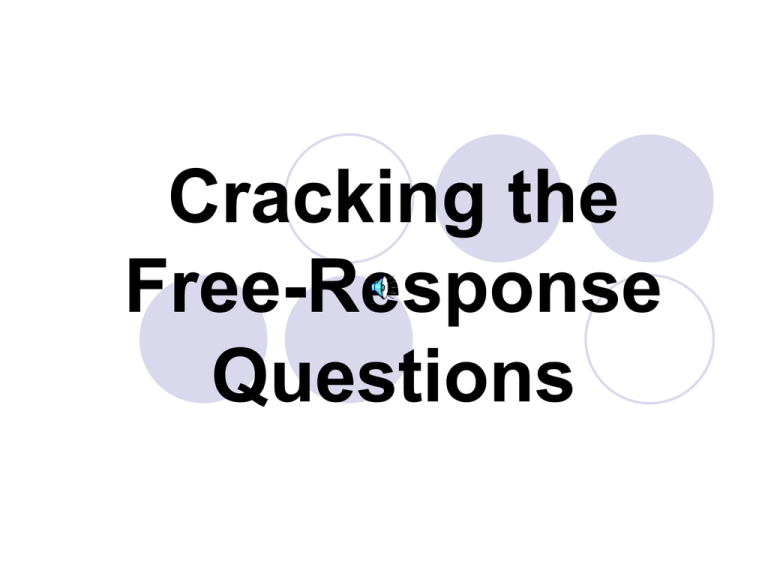
Cracking the Free-Response Questions What is the Free-Response Question Two-part essay section consisting of two groups of questions First group asks questions about the period before the Civil War Second groups asks questions about the period after the Civil War You must choose 1 question from each group Free Response is the final section of the AP US History Exam Administered immediately following the DBQ 70 minutes to plan and write both essays Graded on a scale of 1-9 Free Response is worth 25% of your AP Grade So Remember… Free Response has 2 pairs of questionsyou must answer 1 question from each of the pairs (1st pair: pre-Civil War; 2nd pair: post 1865) Choose the questions you know most, not ones that look easiest Analyze the question. Circle/underline important words and phrases Once you understand, create grids, graphs, columns, diagrams in which to organize your notes on the essay Decide on a thesis, and then write an outline for your essay Follow your outline. Stick to one important idea per paragraph Support your ideas with historical evidence Write clearly and neatly. Do not write overly complex sentences Use transition words to indicate continuity of thought and changes in the direction of your argument Stay positive. Do not panic. Look at the Free Response Rubric What are the differences in: Superior Essay Strong Essay Adequate Essay Essay-AP Score 2-4 Essay-AP Score 1 Unit II Free-Response Samples Question # 1 Explain the influence of TWO of the following on the U.S. decision to go to war in 1812 Embargo policies of Jefferson and Madison British impressment of American seamen Settlers’ conflicts with Native Americans Expansionist goals of the War Hawks Sample answer to question 1 The U.S. went into the war of 1812 because of British impressment of American seamen and the embargo policies of Jefferson and Madison Based on the rubric, what would you rate this? Superior thesis (with strong analysis) Strong thesis (contains general analysis) Clear thesis (needs general analysis) Undeveloped thesis (simple thesis, no analysis) No thesis What is analysis? In a history based essay analysis refers to using historical evidence to support Cause and Effect How Why Now, based on the rubric, what would you rate this? Superior thesis (with strong analysis) Strong thesis (contains general analysis) Clear thesis (needs general analysis) Undeveloped thesis (simple thesis, no analysis) No thesis Undeveloped thesis Why? It simply restates the question Does not have any analysis No why, causes and effect or how addressed in thesis statement What would a superior thesis look like? Clearly answers all parts of the question Can be 1-2 sentences in the first paragraph of the essay Provides clear analysis of the topic by addressing why, cause and effect and/or how Undeveloped thesis The U.S. went into the war of 1812 because of British impressment of American seamen and the embargo policies of Jefferson and Madison Clear thesis (needs more general analysis) The War of 1812 had many causes, but the two most significant causes are British impressment of American seamen and embargo policies of Jefferson and Madison. Strong thesis (contains general analysis) The War of 1812 had many causes, but the two most significant causes are British impressment of American seamen and embargo policies of Jefferson and Madison. The issue of British ships taking American sailors fueled the anger of Americans towards the British. In addition to impressment, the embargo acts negatively impacted American and British trade, further fueling the desire to go war with the British. Superior thesis The U.S. went into the war of 1812 because of British impressment of American seamen and the embargo policies of Jefferson and Madison. Although Washington had the Jay Treaty with Britain, the issue of British ships taking American sailors was not addressed, fueling the anger towards the British among Americans. To address the issue of impressment, Jefferson and Madison enacted embargo policies, which resulted in negatively impacting both United States’ and British trade, further adding to the desire to go to war with Britain. Sample introduction paragraph After fighting for American independence and winning, the U.S. did not want further conflict with Great Britain. The U.S. was able to avoid a second war with Britain for25 years, but in 1812, the U.S. and Britain were engaged in conflict once again. This war became known as the War of 1812. The War of 1812 had many causes, but the two most significant causes are British impressment of American seamen and embargo policies of Jefferson and Madison. Although Washington had the Jay Treaty with Britain, the issue of British ships taking American sailors was not addressed, fueling the anger towards the British among Americans. To address this issue of impressment, Jefferson and Madison enacted embargo policies, which resulted in negatively impacting both United States’ and British trade, again fueling the desire for war with Britain. What will the rest of the essay look like? Paragraph 2 TS: After winning its independence, the United States wanted to avoid further foreign conflict in order to focus on domestic issues as evident through the Neutrality Proclamation and Jay Treaty. Paragraph 3 TS: Although Washington had signed the Jay Treaty in hopes of avoiding conflict with Britain, the issue of British impressment of sailors continued, which made Americans angry towards the British. Paragraph 4 TS In reaction to British impressment, President Jefferson and Madison passed embargo acts. One of the goals of the embargo acts was to force Britain to stop impressing sailors. The result of the embargo acts through, was that both American and Britain trade was negatively impacted. Conclusion Restate thesis : impressment and embargo acts were most influential causes of War of 1812 Restate 3 points: US wanted to avoid conflict British impressment continued Embargo acts hurt US economically Work in pairs to form a superior thesis to this question: How did economic, geographic, and social factors encourage the growth of slavery as an important part of the economy of the southern colonies between 1607 and 1775
